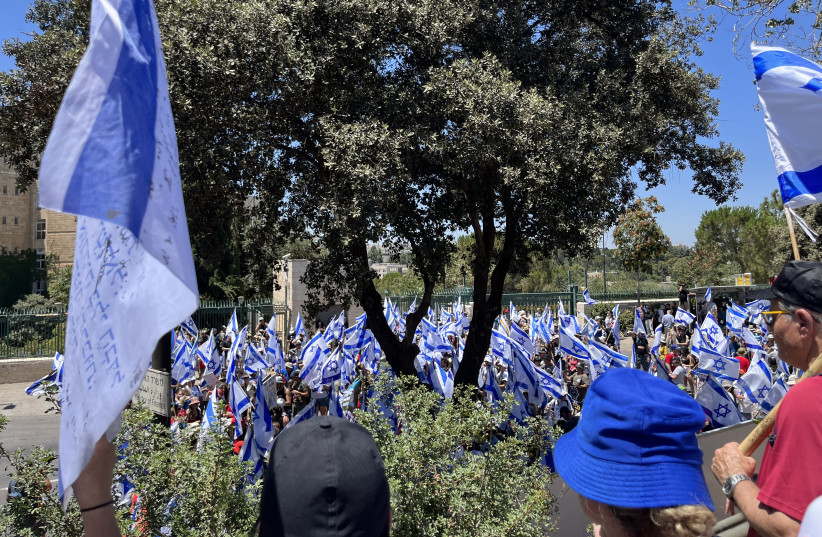Horns blaring and chants of “Democratia” (Democracy) could be heard from down the road as thousands of protesters gathered in front of the Knesset on Monday to protest the impending passing of the Law to Cancel the Reasonableness Standard.
The protesters stood as close as they could to police barricades set up in front of the Knesset plaza, with the ubiquitous Israeli flags that have become an emblem of the movement against the government’s judicial reform plans.
Thousands more assembled along the hilled platforms of Wohl Rose Garden, opposite the Knesset, to show support and add chants of their own. Higher up, people took shelter under trees and makeshift tents.
Some ate sandwiches or refueled on water, while a few laid down for a short nap, harnessing their energy for the likely louder, more forceful demonstrations that would likely break out later in the day if the bill passed in its third reading.
A man with a bullhorn walked by shouting, “What’s happened here? Inside that building, our government is gathering, but not for democracy. They stand before a dictator. Remember that.”

He was walking from nearby Sacher Park, where thousands of protesters have been camping since arriving in Jerusalem on Shabbat after a multiday march.
Protestors have the next generation of Israelis on their minds
Orlin Gatt, one of the campers, said she was there on behalf of her children.
“I’ve never demonstrated before,” she said. “But I have two daughters here, and I don’t want them to be raised in a country where the next law might be to limit them in their freedoms… I would never agree to it.”
Some at the campground said they had been there for more than five days.
“It’s my duty as a citizen,” said Yuval Zinman, who came on the march from Tel Aviv to Jerusalem.
The sound of an ambulance rang in the distance, amid the 37-degree heat and the constant threat of dehydration.
Rivki, who only wanted to use her first name, handed out water at a makeshift protest hub.
“We’re united in this effort,” she said. “We look out for one another.”
“Anavim?” another woman asked, handing out plump, green grapes that weren’t quite ripe.
Their sourness was a fitting taste against the backdrop of the protests, as anger-fueled chanting intensified and the crowd grew. It was a sourness that kicked into sweetness, amid the crowd of Israelis, sitting in the shade of pomegranate trees while sharing food and watching the sea of Israeli flags flutter.
Despite the likely outcome of the vote inside the Knesset, there was a sense of hope, and if not hope, then determination that all their efforts would eventually bear ripe fruit.
